I’ve explored the top social media scheduling tools for small businesses in 2025 that save time, boost engagement, and streamline content management. Platforms like those supporting automation, cross-platform posting, and analytics are ideal, especially with user-friendly interfaces and scalable plans. Tools with strong customer support also minimize downtime and technical issues. If you want to discover which options fit your needs and how to maximize them, keep going—you’re about to find out more.
Key Takeaways
- Prioritize tools with user-friendly interfaces and visual dashboards for easy content management.
- Select platforms offering automation, auto-scheduling, and cross-platform posting to save time.
- Ensure compatibility with various social media channels and support for media formats like videos and images.
- Opt for solutions with strong customer support and platform reliability to minimize operational disruptions.
- Consider scalability, flexible plans, and affordable pricing options suitable for small business growth.
Custom Multi Business QR Code Sign for Payment and Social Media
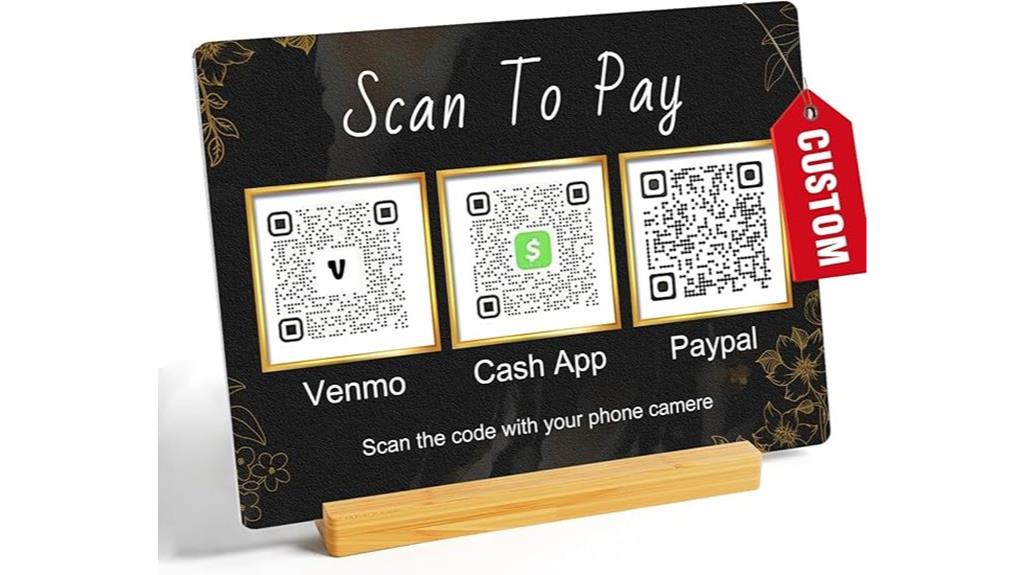
If you’re looking for a professional way to streamline customer payments and social media engagement, the Custom Multi Business QR Code Sign is an excellent choice. It supports up to four QR codes, making it easy for customers to pay via Venmo, PayPal, or Zelle, and connect to your social media profiles like Instagram, Facebook, or TikTok. With customizable styles, background fonts, and sizes ranging from 6 to 12 inches, you can match it perfectly to your brand. Made from durable metal, it’s built to last in busy environments. Customers find it easy to scan, and its professional look enhances your business’s image.
Best For: small to medium-sized retail stores, salons, and service providers looking to enhance customer engagement through customizable, durable QR code signage.
Pros:
- Supports up to four customizable QR codes for versatile payment and social media links.
- Made from high-quality, fade-resistant metal with a professional appearance.
- Available in multiple sizes (6-12 inches) to fit various business spaces and needs.
Cons:
- Limited to rectangular shapes, which may not suit all aesthetic preferences.
- Requires proper placement for optimal scanning, which may need some trial and error.
- Slightly higher upfront cost compared to plastic or paper alternatives.
Custom 3D QR Code Sign for Business with Logo
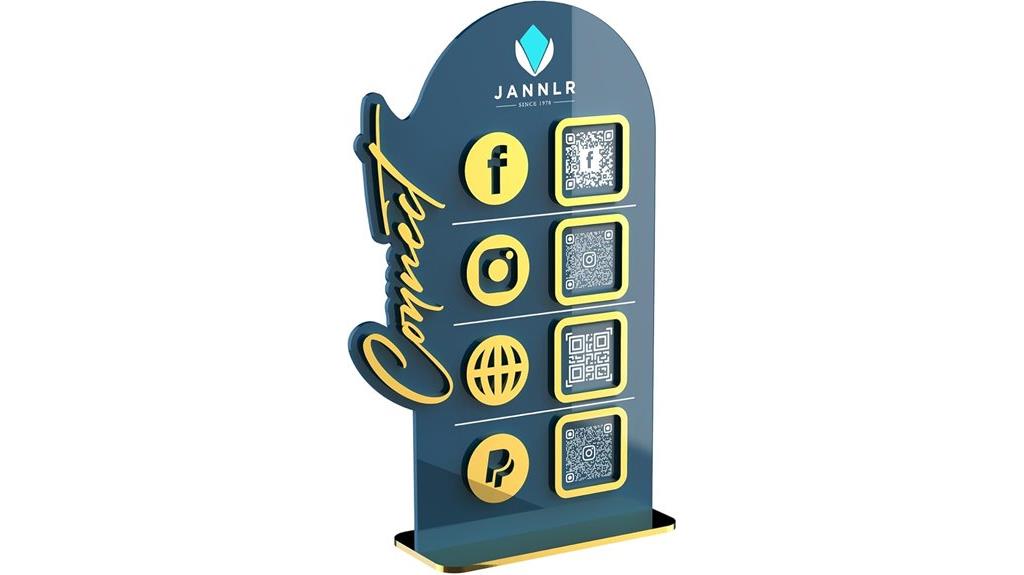
A Custom 3D QR Code Sign for Business with Logo is an ideal choice for professionals looking to elevate their branding and streamline customer interactions. I love how versatile it is—supporting up to four dynamic QR codes for platforms like Facebook, Instagram, and payment options like PayPal and Venmo. With customizable background colors, header titles, and the ability to upload your own codes, it’s tailored to fit your brand perfectly. Made from sleek acrylic with premium metallic finishes, it combines style and durability. It’s easy to set up and perfect for businesses like restaurants, salons, or retail stores, enhancing engagement and transaction efficiency effortlessly.
Best For: small to medium businesses such as restaurants, salons, retail stores, and studios seeking to enhance branding and streamline customer engagement through customizable, stylish QR code signage.
Pros:
- Highly customizable with options for background colors, header titles, and personal QR code uploads
- Elegant design featuring durable acrylic with premium metallic finishes that add a professional look
- Supports multiple QR codes for various platforms, making it versatile for payment and social media integration
Cons:
- Customer rating is moderate at 3.0 out of 5 stars based on limited reviews, indicating potential quality or usability concerns
- Surface blemishes or logo application issues have been reported, affecting appearance and branding consistency
- Price and availability can vary across stores, which may impact purchasing decisions
Social Media Tools and Tips for Small Business Owners
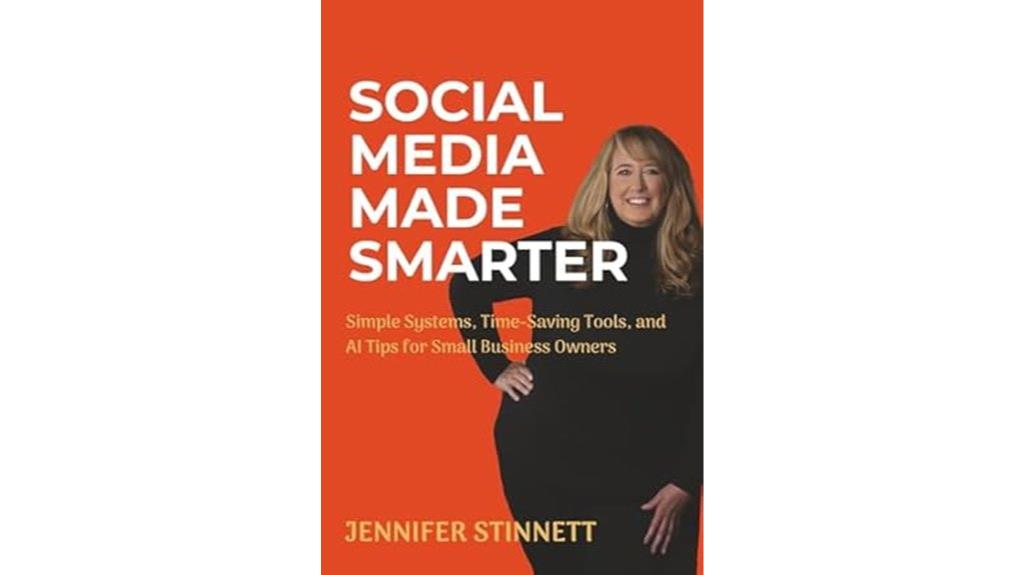
Social media scheduling tools are a game-changer for small business owners who need to manage their online presence efficiently without sacrificing time or quality. These tools streamline content planning, allowing me to create a consistent posting schedule across platforms with minimal effort. I focus on purpose-driven posts that matter, using automation and AI-powered content creation to save time. By leveraging practical resources like ready-to-use prompts, I stay organized and avoid overwhelm. With these tools, I can build a clear online strategy, measure the right metrics, and grow my business confidently—all while maintaining balance and avoiding burnout.
Best For: small business owners and solo entrepreneurs seeking to streamline their social media management with automation and strategic planning.
Pros:
- Simplifies content scheduling and planning across multiple platforms
- Saves time through automation and AI-powered content creation tools
- Helps focus on meaningful metrics, reducing overwhelm and burnout
Cons:
- May require initial learning curve to fully utilize automation features
- Some tools might have limitations on free plans or integrations
- Over-reliance on automation can reduce personal engagement and authenticity
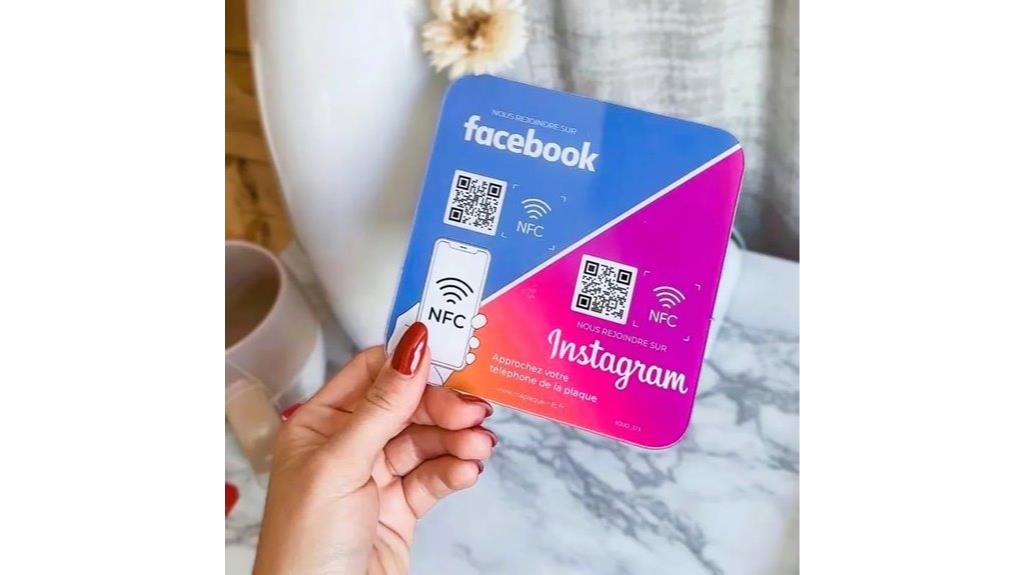
The 2-in-1 social media sign with NFC and QR code display is perfect for retail shops and service businesses looking to boost customer engagement effortlessly. This sleek, durable acrylic sign measures 8 inches in diameter and easily fits into any storefront or service area. Customers can quickly connect with your social media pages by scanning the QR code or tapping their phones via NFC. It encourages reviews, promotes special offers, and increases your online visibility—all without complicated setup. With customizable options to match your branding, this sign adds a modern, professional touch while driving digital interaction and making social media growth simple and effective.
Best For: retail shops, salons, and service businesses seeking an easy, modern way to enhance customer engagement and boost their social media presence.
Pros:
- Easy to set up and use with minimal effort required.
- Durable, sleek acrylic design adds a professional look to any storefront.
- Customizable options allow for branding consistency and aesthetic flexibility.
Cons:
- Limited to businesses with a physical retail or service location.
- May require additional promotional efforts to maximize engagement.
- Not suitable for digital-only or online-only businesses.
The 15 Day AI Income Blueprint: Create Your Online Business Using ChatGPT, Canva & Free AI Tools
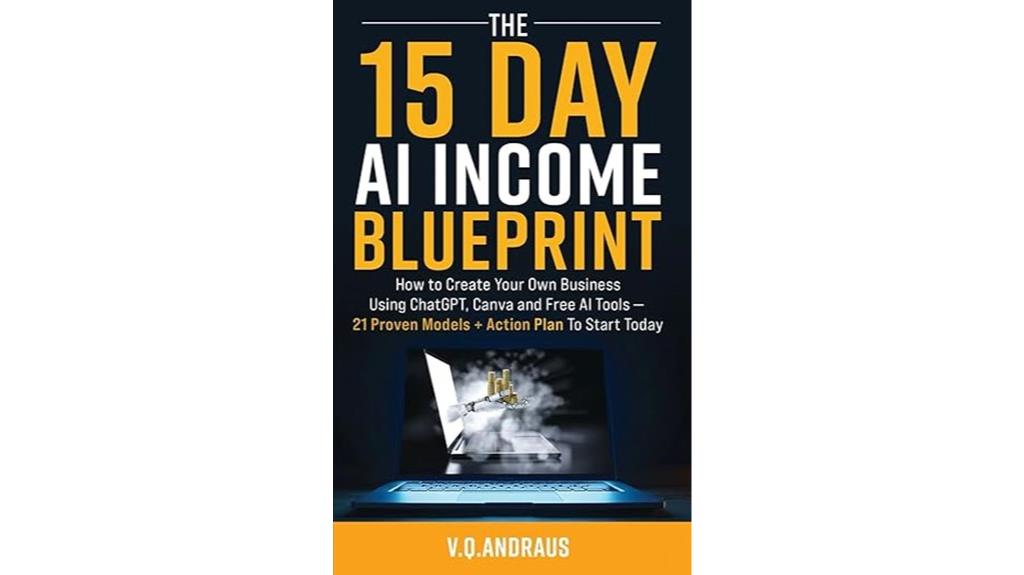
If you’re looking to streamline your content posting and save time, the 15 Day AI Income Blueprint offers a practical approach to building an online business with minimal technical skills. It guides you step-by-step through leveraging free AI tools like ChatGPT, Canva, and MidJourney to create passive income streams. The plan covers choosing a business model, launching your offers, automating processes, and scaling profits—all within just two weeks. This method is perfect for beginners, freelancers, and creatives keen to tap into AI’s potential without heavy investments. It’s an accessible way to start earning online, even if you’re new to entrepreneurship.
Best For: beginners, freelancers, and creatives looking to quickly start and scale an AI-powered online business with minimal technical skills and low investment.
Pros:
- Provides a clear, step-by-step 15-day action plan suitable for beginners.
- Uses free AI tools like ChatGPT, Canva, and MidJourney, reducing startup costs.
- Offers real-life success stories and practical resources to facilitate easy implementation.
Cons:
- Requires consistent effort and discipline to follow through on the intensive 15-day schedule.
- May not cover advanced technical customization for more complex business models.
- Success and income levels depend on individual effort and market conditions, not guaranteed.
Photography Business Basics: A Professional Photographers Guide to Financial Success

Photographers aiming to streamline their marketing efforts will find social media scheduling tools indispensable, especially when juggling multiple clients and projects. “Photography Business Basics” by Natasha Martinez and Mark Maryanovich emphasizes that strong business fundamentals are essential for financial success. It covers pricing, marketing, SEO, and effective client relations—crucial for building a sustainable photography business. The book offers practical, actionable steps like developing marketing plans and understanding digital strategies. By mastering these essentials, photographers can enhance their visibility, attract clients, and ensure profitability. This thorough resource helps you implement effective business practices, making your passion financially rewarding and long-lasting.
Best For: photographers at all skill levels seeking practical guidance on building a profitable, sustainable photography business through effective marketing, pricing, and digital strategies.
Pros:
- Offers clear, actionable steps for pricing, marketing, and digital presence like SEO
- Provides real-world anecdotes and humor to make complex concepts approachable
- Suitable for photographers at any career stage, from beginners to seasoned professionals
Cons:
- Focuses heavily on business fundamentals, which may be less detailed for advanced marketing techniques
- Some readers might find the concise format requires additional resources for in-depth strategies
- The book’s practical advice may require adaptation to specific photography niches or local markets
Factors to Consider When Choosing Social Media Scheduling Tools for Small Businesses

When selecting social media scheduling tools for my small business, I focus on how easy they are to use and whether they support the platforms I need. I also look for flexibility in scheduling and automation features that save me time. Cost is vital too—finding a tool that fits my budget helps me make the best choice without overspending.
User Interface Ease
A user-friendly interface is essential for small businesses choosing social media scheduling tools, as it helps streamline content management without requiring extensive training. An intuitive design reduces the learning curve, making it easier to schedule and manage posts efficiently. Clear navigation and straightforward workflows prevent mistakes and save time during content planning and publishing. Visual dashboards and drag-and-drop features improve usability, allowing quick overview of upcoming posts and easy organization of content calendars. A simple interface minimizes frustration and enables users to adapt rapidly to new tools, boosting overall productivity. Even those with limited technical skills can confidently operate a platform with a well-designed, accessible interface. Prioritizing ease of use ensures smooth daily operations and maximizes the platform’s benefits for your small business.
Platform Compatibility Range
Choosing a social media scheduling tool that supports all the platforms your business uses is essential for efficient content management. I recommend verifying that the tool can handle your active channels, whether it’s Facebook, Instagram, LinkedIn, or Twitter. Cross-platform posting is a huge time-saver, allowing you to publish content simultaneously across multiple channels. Also, check if the tool offers platform-specific features like Instagram Stories or LinkedIn Articles to maximize content versatility. It’s important to confirm that it can manage different media formats—videos, images, links—for each platform. In conclusion, ensure the tool stays current with platform updates, API integrations, and new features so your content remains optimized and compatible as social media evolves.
Scheduling Flexibility Options
Scheduling flexibility options are essential because they determine how easily you can adjust your content plans to fit your changing needs. A good tool should let you quickly modify or reschedule posts across platforms without hassle. Features like auto time zone adjustments help ensure your content goes live at the best times for your global audience. The ability to set recurring or automated schedules boosts efficiency and keeps your content consistent. Drag-and-drop calendar interfaces make rescheduling intuitive, saving you time. Advanced options, such as multiple posting windows per day or week, give you control over how and when your content appears. Overall, flexible scheduling features enable you to adapt swiftly, optimize engagement, and maintain a steady online presence.
Automation Features Available
Have you ever wondered how automation features can streamline your social media efforts? These features allow you to schedule posts that publish automatically, saving you time and effort. Many tools also include content recycling, where evergreen posts are reshared at set intervals to boost engagement. Advanced automation offers audience targeting, personalized messaging, and trigger-based posting that reacts to user interactions or specific times. Integration with other marketing tools enables seamless workflows, like auto-publishing blog content or syncing with email campaigns. Additionally, automation often includes analytics reporting, which automatically tracks performance metrics. This insight helps you refine your strategy without extra work. Overall, automation features empower small businesses to maintain consistent, targeted, and effective social media presence with less manual effort.
Cost and Budget Fit
When selecting social media scheduling tools for your small business, evaluating their pricing plans is essential to *verify* they fit within your budget. I recommend comparing both monthly and annual options, as some tools offer discounts for yearly commitments. Look for scalable plans that can grow with your business, allowing you to upgrade or downgrade as needed. It’s also wise to test tools with free trials or freemium versions to assess features before committing financially. Calculate the cost per social media account or user to identify the most economical choice for managing multiple platforms. *Finally*, be aware of extra fees for premium features, integrations, or higher post limits, as these can quickly impact your overall budget.
Analytics and Reporting
How can small businesses guarantee their social media efforts are effective? By choosing tools with strong analytics and reporting features. These tools offer detailed insights into engagement, follower growth, and audience demographics, helping us refine our content strategies. Look for customizable dashboards and export options so we can track key metrics over specific periods. Data-driven reports reveal the best times to post, which content types perform best, and which platforms deliver the highest ROI. Accurate analytics also highlight audience behavior patterns, allowing us to tailor messaging for better engagement. Additionally, measuring campaign success through click-through rates, conversions, and hashtag performance helps optimize our social media marketing efforts. Ultimately, robust analytics turn raw data into actionable insights, making our social media presence more effective.
Collaboration Capabilities
Choosing the right social media scheduling tool for small businesses means considering how well it supports team collaboration. Effective collaboration features allow team members to assign roles, share access, and set permissions, making it easier to work together smoothly. Real-time editing, comment sections, and activity logs help maintain clear communication and track changes, reducing confusion. Centralized content approval guarantees consistency and prevents mistakes before posts go live. Being able to assign specific tasks like content creation, review, and scheduling streamlines workflows and boosts efficiency. Data shows that platforms supporting multi-user access and collaboration tend to increase productivity and cut down the time needed to plan and publish content. In short, strong collaboration capabilities are essential for seamless teamwork and maintaining a consistent online presence.
Customer Support Quality
High-quality customer support is essential in selecting a social media scheduling tool because it guarantees quick resolution of technical issues, keeping your content flow uninterrupted. Responsive support channels like live chat and phone help ensure immediate assistance, reducing frustration and keeping you productive. A knowledgeable support team can also guide you through platform features and best practices, maximizing your tool’s potential. Reliable support services often include detailed FAQs, tutorials, and onboarding resources that make adoption easier and ongoing use smoother. Good customer support not only resolves problems efficiently but also boosts your satisfaction and loyalty, fostering a better long-term relationship. Ultimately, choosing a platform with strong support means fewer disruptions and more confidence in managing your social media presence effectively.
Frequently Asked Questions
How Do Social Media Scheduling Tools Enhance Customer Engagement?
Social media scheduling tools really boost customer engagement by helping me post consistently and at ideal times. They allow me to plan content ahead, ensuring my audience stays interested and engaged. Plus, I can analyze engagement metrics to refine my strategy. This proactive approach makes my interactions more meaningful, encourages conversations, and builds stronger relationships with my followers, ultimately growing my online presence and customer loyalty.
Can Scheduling Tools Integrate With E-Commerce Platforms Effectively?
I’ve seen firsthand how scheduling tools can seamlessly integrate with e-commerce platforms, boosting sales and efficiency. For example, a small clothing store I worked with linked its Instagram scheduler directly to Shopify, automatically posting new arrivals and updating stock info. This integration saves time, keeps content fresh, and drives traffic. Yes, many tools now effectively connect with platforms like Shopify and WooCommerce, making online selling smoother and more automated.
What Security Measures Should Small Businesses Consider in Scheduling Tools?
When choosing scheduling tools, I always prioritize security. I look for features like data encryption, two-factor authentication, and regular security updates. It’s vital to guarantee the tool complies with data privacy laws and has a solid reputation. I also check if they offer access controls so I can limit permissions for team members. Protecting my business’s data and customer information is essential for maintaining trust and avoiding breaches.
Are There Any Hidden Costs Associated With Popular Scheduling Platforms?
Thinking about hidden costs in scheduling platforms is like opening a Pandora’s box—you never know what surprises await. I’ve found that some popular tools offer tempting free plans but charge extra for features like analytics, team collaboration, or premium support. Always read the fine print, ask about additional fees, and consider your needs carefully. It’s better to pay a little more upfront than face unexpected charges down the road.
How Do Analytics Features in Scheduling Tools Improve Marketing Strategies?
Analytics features in scheduling tools help me understand what content resonates most with my audience. I can track engagement, reach, and click-through rates, which guides my content strategy. By analyzing this data, I identify what works and adjust my posts accordingly. It’s like having a roadmap for my marketing efforts, ensuring I focus on strategies that boost growth and improve my online presence effectively.
Conclusion
In today’s digital landscape, using the right social media scheduling tools can boost your small business’s online presence considerably. Did you know that businesses that plan their social media content see up to 30% higher engagement? By choosing the right tools, you streamline your workflow and connect more effectively with your audience. So, explore your options and pick the tools that fit your goals—your online growth depends on it.









